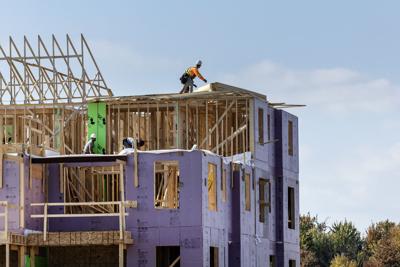As the summer months draw to a close, the state of the housing market in Canada’s major urban areas is a top priority.
The latest data is unequivocal: without immediate action, the repercussions will not only deepen the housing crisis but also undermine economic stability and employment, at a time when our country is confronting recessionary threats.
According to Altus Group, there were just 359 new home sales in the GTA in July 2025, a staggering 48 per cent decline from July 2024 and 82 per cent below the 10-year average.
Sales in Vancouver and Ottawa show similar downturns at 70 and 50 per cent below historic levels.
Sadly, July’s results are not an anomaly but part of a worsening trend.
Year-to-date sales in 2025 stand at 3,007 units, compared to 4,434 during the same period in 1990, one of the most difficult years on record and at a time when our population was significantly smaller and housing needs less acute.
July’s results mark the worst month since public sales records for new homes in the GTA began in 1980. July was the latest month in the lowest 12-month period for sales on record. In a typical year, about 35,000 units would be sold with 2025 on track for just less than 6,000 — a 29,000 shortfall which will translate into 29,000 fewer housing starts, on top of weak numbers in 2023 and 2024.
Altogether, it means 60,000 homes that should be built in the GTA in the coming years will simply not be there. And history shows that when supply tightens affordability quickly erodes.
Building leaders in Canada’s largest housing regions have joined forces in a coalition to
And don’t count on purpose-built rental (PBR) construction to fill the gap. The same cost pressures that have created a pricing floor and kept new home prices flat for nearly two years are also challenging PBR projects with a resulting decline in any hope the rental supply will fill the housing shortfall.
There is a growing consensus among analysts that the housing market is in trouble. RBC reports that housing starts across Ontario fell nearly 24 per cent year-over-year in July, hitting a five-year low.
The CHMC has tracked declining starts in the GTA since last August and its latest projection sees national starts falling by 20 per cent in the coming years.
We’ve seen this movie before: The 1990s downturn left a lasting mark on our economy, with lost jobs in construction and skilled trades, widespread financial strain on Canadians, and a prolonged recovery. As governments head back to work, the need for speed and purpose could not be greater.
That means three things:
First, federal and provincial governments must immediately launch a comprehensive HST exemption. As Ontario’s Premier Doug Ford has indicated, this is not the time for half measures. A full HST exemption the first million of a new home or substantially renovated home is the only fair and equitable policy approach — and one that reflects the original intent of the GST policy on new home construction.
Second, the province must expedite full implementation of Bill 17. While it is working to deliver long-overdue changes to development charges, much of the heavy lifting is being done by regulations still under development.
Specifically, in collaboration with the federal government, work must be accelerated to redefine how major infrastructure and transit investments are funded and stop placing the burden on new home buyers. By implementing these solutions, costs can be lowered substantially and equitably to help advance housing starts in the region.
Third, municipalities in the GTA must consider what they can do to create an economic and regulatory environment that supports new housing construction rather than hinder it.
Some — Mississauga, Peel, Vaughan — have acted on development charges. Others, like Toronto, have adopted a new approach for approvals.
Councils across the GTA need to ensure policies and procedures encourage new housing rather than putting up costly roadblocks in the form of excessive fees and red-tape delays. Housing is more than just shelter — it is an economic engine in the region.
The residential construction industry supports hundreds of thousands of jobs in the GTA, from skilled trades to suppliers, professional services to manufacturers. When new home sales decline, jobs disappear.
Altus Group has estimated that approximately 40 per cent of direct jobs in the new housing sector are at risk, not to mention billions in investment, taxes and other spin off impacts.
The time for decisive action and leadership is now. Without it, we risk repeating painful lessons of the past.
With it, we can ensure Canadians seeking a new house to call home can do so and that workers who haveinvested their careers in our sector can continue to build.






























To join the conversation set a first and last name in your user profile.
Sign in or register for free to join the Conversation